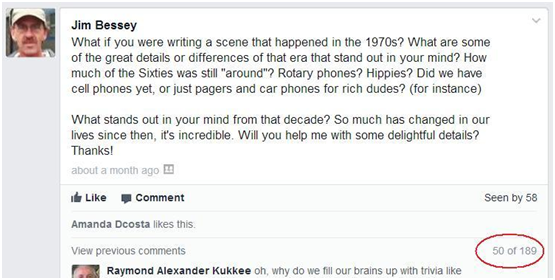“‘Google’ is not a synonym for ‘research’,” says novelist Dan Brown.
If you want to be a serious writer (and don’t we all?), sooner or later you’re guaranteed to hit a brick wall.
To get beyond the brick wall, you are forced to do some … (sound of ominous music) research.
I think novelist Allan Leverone (Parallax View) spoke for most writers when he said:
“I hate research. … When I’m writing, I would much rather be writing than researching. I want to learn enough about a subject to ensure that you, as a reader, are not forced out of the story by a lack of realism in the writing.”
One of my best friends, a prolific writer who churns out new chapters every week, doesn’t shy away from brick walls. She’s found a great way to tackle research painlessly. In fact, she hardly ever asks Google for help.
Instead, she uses a smart technique that works like magic — and has an exciting extra benefit. More on that in a minute.
How do you get answers?
If you’re anything like me, you probably run straight to Uncle Google if you need research help when you’re writing. You know the drill …
Save Document. Open Google Search window. Type in question or keywords. Begin clicking links, reading, and taking notes.
What’s wrong with that method?
Most of the time, nothing at all.
A quick Google Search works perfectly about 80% of the time. You know how that 80/20 rule works, don’t you? It’s the 20% that will drag you down.
Part of the 20% is that Google searches come with their own baggage, including:
- “Sponsored Results” (gee, thanks!)
- Thousands of possible sources
- Threaded discussions on private forums (“You must be a Member…”)
- Distracting side trips to read ‘related’ information
Google’s Achilles Heel
One more thing. Search engines like Google, amazing as they are, still have an important shortcoming:
They aren’t good at answering complicated questions.
We writers love to paint ourselves into tricky corners.
For instance, when Leverone was working on Parallax View, he wanted to describe the dark depths of The Kremlin. How the heck do you research that? Not many writers can afford to travel to Moscow for a personal tour. If you try an Image Search, almost every photo is from the outside. Now what?
Closer to home, author Teresa Burrell recently needed to learn all about the mysteries of strip bars for a scene in her upcoming novel. That’s a dicey keyword search, and could easily lead to a host of sites that would not give her the information she wanted.
So, if you can’t — or don’t want to — go there in person, what should you do? (Hint: My friend and Ms. Burrell both used a similar approach.)
Wait, why not just wing it?
What if you just make stuff up? There are times you can get away with that, and even times when you should. For instance, respected writers create fictional locations near real places all the time.
If you use real places you’ve never visited, one of the most common errors you can make is with the climate. Does it rain much in Tucson in June? How cold should Seattle be in January? If you simply make educated guesses about these details, real residents of those areas will catch you on it.
Or maybe you figure you’ve seen enough murder mysteries on TV to bluff your way through settings and procedures. Keep in mind, however, that real cops read books too — and those folks are trained to spot mistakes.
You have to be careful about skimping on the research. Your readers will come from all kinds of places and backgrounds. Make an important misstep, and it can put a gaping dent in your credibility.
Help… I’m stuck in the bathroom!
Last month, I came across a surprising goof by an established author. It happened in the middle of an otherwise wonderful novel, in a pivotal scene involving the main character. In a nutshell, the male protagonist helps his new girlfriend fix the broken bathroom door, in the process meets her young son, and eventually becomes intimate with the girl.
Doesn’t sound terribly tricky, does it?
Unfortunately, the writer had only a vague idea of what could go wrong with a door and how to fix it. Equally unfortunate (for him) was the fact that I am an experienced carpenter.
Anyone who’s ever tried to fix a door knows that drilling quarter-inch holes isn’t part of the plan, but that’s what this writer had his character do.
For me, the novel’s bubble had burst. The author’s unexpected mistakes zapped me right out of the story and made me question everything else he had earlier described. This small error made me doubt what I’d thought were brilliant details about forensics and police procedures. Maybe another reader with a background in lab work found some ‘broken door’ errors of her own in that story!
How to avoid this happening in your writing?
Back to my prolific writer friend who doesn’t depend on Google alone for the answers. How do you think she might have handled that bathroom door-fixing scene?
Easy– she would have asked me (her ‘fix-it friend’) for help. I’d have handed her some practical ideas in about five minutes. I’ve seen her pose problems like these to her network of buddies dozens of times, with amazing results.
When you need answers to tricky questions, ask your network for help.
Tap into the power of your friendships, using social networks like Facebook and Twitter. You will be amazed at the breadth of knowledge your online contacts have at hand, and how quickly they can deliver that information to you.
Last month, I was writing a short flashback scene. I wanted my heroine to reminisce about a time thirty years earlier.
Cue up That ’70s Show
To make it clear that her memories were set in the 1970s, I needed specific details of the era. Try Googling “What do you remember about the ’70s?” Now let me know when you’re done sifting some of the 21 million search results.
Instead, I followed my friend’s advice. I reached out to my network. Just one short post on Facebook to see what my contacts there could recall from the 1970s. One hour — and over 180 replies — later, I had enough information for an entire novel set in that decade!
You can work it too!
Your question doesn’t have to be as broad as mine for this method to work well.
When Teresa Burrell was investigating strip clubs for her book, she specifically wanted to know more about lap dances (seriously!). She picked up the phone and started asking her male friends for the inside scoop. Not only did Teresa find out more than she ever wanted to know, but she had fun learning the details. Wouldn’t you love to have transcripts of those phone conversations?
Why does this work so well?
It turns out that people enjoy helping writers get it right.
We all love to feel like experts at something. For instance, isn’t it fun when you can tell a lost driver exactly how to find Aunt Millie’s Bed & Breakfast?
Maybe you know how to shoot skeet, or how to prune a rosebush, or how to find a cheap used Corvette. Each of us knows something interesting, or knows someone who knows.
Never underestimate the power of networking.
For example, you now know that I’m a knowledgeable carpenter; but did you know that one of my best friends is a deputy sheriff? Just imagine all the cool insider knowledge he could offer for your next thriller!
All you have to do is ASK.
The best part is, it’s fast and fun — for both you, and the people who help you!
You can do it by email to a group, on Facebook like I did, on Twitter (might need a hashtag), or Google+, Pinterest, LinkedIn — wherever your friends gather in force.
Did I mention the exciting extra benefit?
When you reach out for help and answers, your circle of friends will become more invested in your writing. They will want to read it! This curiosity and interest extends outward to include anyone who participates in your conversation, even people who are only watching the discussion.
People you’ve never met, friends of your friends, can be drawn in simply because they have the expertise you seek. When you ask for help, you can end up making new friends, creating larger networks of people interested in what you’re doing. They will be far more likely to read and share your articles, to buy and promote your novels, and to trust your recommendations.
New friends, more readers, improved sales and more – grab this non-Google research tool as soon as you can!
Have you uncovered any surprising mistakes in your recent reading? Or ever made a mistake yourself? Or have you used your network for research? Share your experiences in the comments below!

















